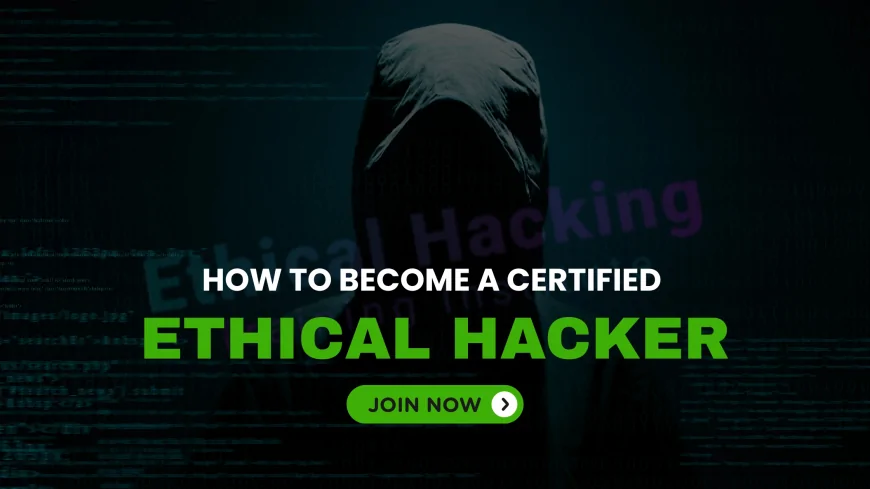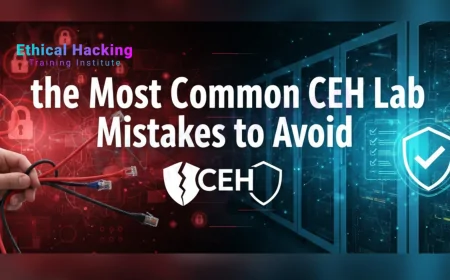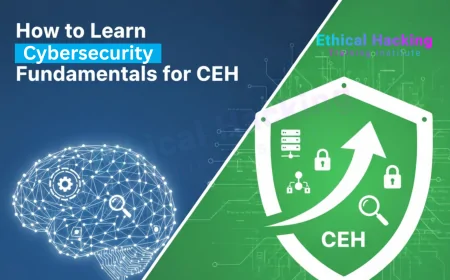How to Become a Certified Ethical Hacker: A Step-by-Step Guide | A Beginner’s Roadmap to Becoming a Certified Ethical Hacker
Learn how to become a Certified Ethical Hacker with this step-by-step guide. Explore training options, costs, exam tips, and career advice.

Table of Contents
- Introduction
- Understand What CEH Is
- Meet Prerequisites
- Choose Your Training Path
- Practice with Labs
- Register & Pay Exam Fee
- Study & Revision
- Take the CEH Exam
- Take CEH Practical (Optional)
- Renewal & Continuing Education
- Launch or Advance Your Career
- Frequently Asked Questions (20)
- Conclusion
Introduction
Becoming a Certified Ethical Hacker (CEH) is one of the most respected cybersecurity achievements. This guide walks you through each step—from prerequisites to career advancement—detailing what you need and what to expect along the way.
Understand What CEH Is
The Certified Ethical Hacker (CEH) is a globally recognized cybersecurity certification offered by the EC-Council (International Council of E-Commerce Consultants). It validates an individual’s ability to legally and ethically hack into systems to identify and fix security vulnerabilities—essentially using hacker techniques for defensive purposes.
What Does CEH Cover?
The CEH certification focuses on simulating a hacker’s mindset to:
-
Identify vulnerabilities
-
Assess risks
-
Exploit weaknesses (legally)
-
Strengthen system defenses
It teaches tools, techniques, and methodologies used by malicious hackers, but in a controlled, professional, and ethical manner.
Core Domains in CEH v13 (2025)
-
Information Gathering & Footprinting
-
Scanning Networks & Enumeration
-
Vulnerability Analysis
-
System Hacking & Privilege Escalation
-
Malware Threats & Ransomware
-
Sniffing, Session Hijacking & Denial of Service
-
Social Engineering Attacks
-
Web Application Hacking
-
SQL Injection & Advanced Exploits
-
Cloud, IoT, and OT Hacking
-
Cryptography & Steganography
-
Evading IDS/Firewalls/Honeypots
What Skills Will You Gain?
-
Use of tools like Nmap, Metasploit, Burp Suite, Wireshark
-
Manual and automated vulnerability exploitation
-
Real-world lab simulation via CEH Practical (optional)
-
Red team vs. blue team methodologies
Who Should Pursue CEH?
-
Cybersecurity analysts
-
Network & system administrators
-
SOC professionals
-
Ethical hackers and penetration testers
-
Anyone seeking a career in offensive security
Meet Prerequisites
- Basic computer & networking knowledge (TCP/IP, OS, scripting)
- Recommended: 1–2 years in IT or security roles
- No formal degree required, but certifications like Security+/Linux+ help
Choose Your Training Path
You can prepare through:
- Self-study: Official EC‑Council book, videos, cybersecurity blogs.
- Self-paced online: Platforms like Udemy, Edureka, Coursera.
- Instructor-led: Authorized Training Centers (ATCs) like EC‑Council official, Axximum, WebAsha, SANS.
- Bootcamps: Fast-paced, immersive training (e.g., Training Camp, SANS bootcamps).
Practice with Labs
- Use virtual labs (Kali Linux, iLabs, TryHackMe, Hack The Box)
- Complete hands-on modules—scan, exploit, escalate, report
- Use CTFs to apply knowledge under time pressure
Register & Pay Exam Fee
Create an EC‑Council or Training Provider Account, submit required documents, then pay for the 125-question MCQ exam voucher (~$950–$1,199). Optional: application fee for self-study candidates.
Study & Revision
- Create a 6‑8 week study plan
- Use flashcards, mock tests, search console questions
- Join prep groups via Discord or Reddit
Take the CEH Exam
Take the 4-hour online-proctor exam with 125 multiple-choice questions. Passing score varies—review your candidate report and request retake vouchers if needed.
Take CEH Practical (Optional)
Complete the 6-hour hands-on challenges for up to 20 objectives to earn the CEH Master title. Requires separate fee but demonstrates real hacking skills.
Renewal & Continuing Education
CEH is valid for 3 years. Maintain certification through 60 EC-Council ECE credits via webinars, events, training, or contributions. Pay $80/year membership fee.
Launch or Advance Your Career
- Showcase CEH + write-ups on LinkedIn & GitHub
- Apply for roles: penetration tester, SOC analyst, security engineer
- Use ETSC portal/job boards, attend industry meetups
- Advance: consider OSCP, GPEN, LPT
Frequently Asked Questions (FAQs)
1. Can I do CEH with no IT background?
Yes—self-paced and online options guide you from the basics of networking and Linux through to CEH topics.
2. How long does CEH preparation take?
Typically 3–6 months depending on your pace and lab time.
3. Is CEH worth it for beginners?
Yes—for roles like SOC analyst or junior penetration tester—but practice is key.
4. What's CEH Practical?
It's a live, hands-on lab exam testing real-world ethical hacking skills.
5. How much does CEH cost?
Training ranges from $500 (self-study) to $3,500 (live); exam voucher is $950–$1,199; Practical is $550.
6. Can I take CEH online?
Yes—EC‑Council offers proctored online exams and many providers deliver online learning.
7. What tools do I learn?
Nmap, Metasploit, Burp Suite, Wireshark, John the Ripper, Hydra, Aircrack-ng.
8. Do I need Kali Linux?
Kali is a recommended hacking platform with built-in tools—you can also use Parrot or custom VMs.
9. Can I retake the exam?
Yes. If trained via EC‑Council, retake costs $100; otherwise $499.
10. How often to renew CEH?
Every 3 years—earn 60 ECE credits and maintain EC‑Council membership ($80/year).
11. Does CEH help with bug bounty?
Yes—CEH teaches foundational skills used in bug bounty platforms like HackerOne.
12. Which is harder: CEH or OSCP?
OSCP is more technically demanding, requiring hands-on exploitation and scripting skills.
13. Is CEH recognized globally?
Yes—recognized across 150+ countries and in frameworks like DoD 8570/8140 and NICE 2.0.
14. Can I do CEH while working?
Absolutely—self-paced or weekend classroom formats accommodate working professionals.
15. How do I get practical experience?
Practice with TryHackMe, Hack The Box, iLabs, CTFs and virtual pentest environments.
16. What careers follow CEH?
Roles like ethical hacker, pentester, SOC engineer, vulnerability analyst, red-team member.
17. Is exam preparation essential?
Yes—mock tests reveal weak areas and build exam confidence.
18. Do I need scripting skills?
Basic scripting (Python/Bash) helps with automation but is not essential to pass CEH.
19. What’s the CEH passing score?
Varies between 60–85% depending on the exam form.
20. What to do after CEH?
Consider advanced certs like OSCP or SANS GPEN, specialize in cloud/hardware security.
Conclusion
The Certified Ethical Hacker path involves commitment but pays off. By following this step-by-step process—over 3-6 months—you can gain a respected credential, practical abilities, and strong career opportunities in cybersecurity. Stay curious, hands-on, and adaptable.
What's Your Reaction?
 Like
0
Like
0
 Dislike
0
Dislike
0
 Love
0
Love
0
 Funny
0
Funny
0
 Angry
0
Angry
0
 Sad
0
Sad
0
 Wow
0
Wow
0

















